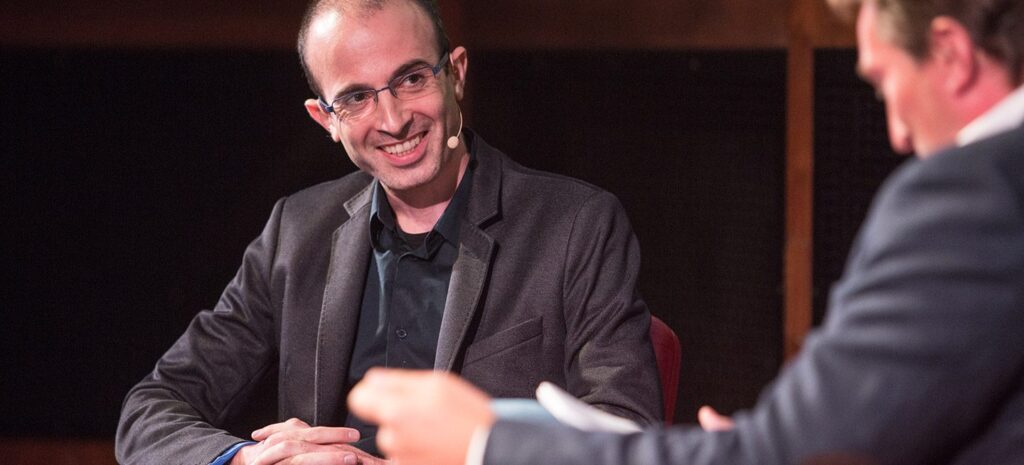Learn more about the key arguments of Homo Deus, Yuval Noah Harari’s 2016 book, as the author discusses the biggest questions raised by its discourse in the review below.
What lies ahead in the future for humankind? Will our technological progress enable us to build a flourishing civilization with the help of machines, or, will our machines keep growing smarter and smarter to the point where humans are deemed irrelevant? These questions, and more, are the engines of concern driving bestselling author Yuval Noah Harari’s 2016 book Homo Deus: A Brief History of Tomorrow. While his previous book Sapiens: A Brief History of Humankind traced the journey of humans from the Stone Age to the twenty-first century, Homo Deus looks to the future as it revisits this history considering the latest scientific research, to better understand where humanity is headed.
Harari claims in Homo Deus that in the 21st century, armed with the rising powers of artificial intelligence and complex data-driven algorithms, humans will make serious attempts to attain happiness, immortality, and divine powers. To what extent humans will succeed or have the fruits of their technological progress turned against them, depends upon how we approach fundamental questions relating to the human mind and whether it’s reducible to machine code. Does the grand story of human progress culminate in an algorithmic reality where humanity transcends itself? This article explores the key arguments of Homo Deus and discusses the biggest questions raised by its discourse.
Summary of Homo Deus
Harari begins by briefly recounting the history of humanity till the present (covered in greater detail in his previous book Sapiens) in a specific light that contextualizes it for his discussion of what the future holds. For Harari, our biggest achievement as a species, which enabled us to dominate other animals and secure our planetary foothold, was our capability for storytelling. Stories enabled us to find (and create) meaning out of the seemingly random jumble of facts and events in the world, thereby leading to social cohesion and the development of more complex units of organization. From the earliest religions and nations to more modern conceptions of rights and laws, money, democracy, corporations etc., it was our collective belief in these fictions that structured our reality as complex intelligent creatures.
Harari argues that these fictions served as the nodal points around which humans, as linguistic beings, cooperated and collectivized on increasingly larger scales. Civilizations coalesced around shared beliefs, as humans collaborated to develop infrastructure – from hunting jungles to agricultural villages to metropolitan cities – as well as pursue knowledge, the latter leading to philosophical and rational thinking and eventually the modern sciences and arts. What’s implicit in such collective investment in fictions is our uniquely human search for meaning: something that acts as a guiding principle, orienting our ethics and providing purpose to our lives. For the longest period in history, the dominant source of such authority has been religions and gods, to be dethroned only very recently by the homo sapiens.
It is the rise of humanism that according to Harari defines the contemporary human condition. From letting the word of god dictate what ought to be done, the source of authority shifted to humans themselves as autonomous rational agents capable of exercising free will. Fittingly, the modern condition is rife with injunctions to “listen to yourself” and “think for yourself”, the fundamental assumption being the superiority of human intelligence and reason over anything else. But this situation is about to change, Harari warns us, and we must be prepared. Developments in biochemical and computer sciences, disciplines which are gradually merging, are suggesting that human emotion and feeling may well be understood as just complex algorithmic processes, instead of something necessarily metaphysical.
What this means, in conjunction with a technological revolution in computing, is the looming spectre of a new data-driven God with the rise of artificial intelligence. This is where homo sapiens (wise man) becomes homo deus (divine man), gaining God-like capabilities of creating new, potentially superior, forms of intelligence. If human decision-making is reducible to algorithmic calculation as the latest research suggests, then soon we might have AI making our decisions for us, much better than we mere humans – limited by our cognitive capacities – possibly could. With advances in quantum computing, machines can now traverse enormous digital databases and perform trillions of calculations in a fraction of the time required by older computers, enabling them to process information at a level of complexity comparable to (and superseding) human cognition.
Intelligence Beyond the Human
One of the dominant concerns in Homo Deus is the overcoming of humanist ideology in the great historical decoupling of ‘intelligence’ from the ‘human’. Throughout history, the notion of intelligence has been inextricably tied to homo sapiens, given that only humans have demonstrated the capacity for processing information at levels sufficiently complex for the formation of abstract fictions like language. Today, however, Large Language Models (LLMs) like ChatGPT increasingly show us how machines can process information at scales far surpassing human capabilities. What this inexorably leads to, as AI tech exponentially develops, is a need to rethink what ‘intelligence’ itself means in the 21st century and how non-human forms of intelligence rekindle questions surrounding human authority.
A striking example Harari provides is that of the EMI (Experiments in Musical Intelligence) program, developed by David Cope, a musicology professor at the University of California in Santa Cruz. Created over seven years, EMI was built to imitate the musical style of Johann Sebastian Bach, and it composed 5,000 chorales in Bach’s style in a single day. When the program was used to do some blind testing, using professional pianists who played a piece composed by EMI alongside one composed by Bach, the audience voted that they found EMI’s composition most soulful, mistaking it for Bach’s, claiming how “the music touched their innermost being”.
If humans were under any illusions that AI would only take over menial mechanical tasks, being unable to match humans when it comes to creating art, such notions are already threatened by even such crude AI in its earliest stages. What such developments, more of them illustrated in Homo Deus, mean for us is that as AI develops and approaches closer and closer to replicating human output, it will become necessary to fundamentally revisit the question of what it means to be human in the first place. Will there be any need at all to have humans in charge of making the big decisions of the future, if our machines can cognitively outperform us? We stand at a disconcerting precipice where, for the first time in history, humans must consider giving up control to machines, unless we manage to reclaim something of value uniquely within humans.

The New Dataist Religion
Whereas antiquity was marked by theism and modernity by humanism, Harari’s Homo Deus predicts the rise of a new religion “which venerates neither gods nor man – it worships data”. Harari calls this Dataism, a paradigm shift where instead of divine or human authorities, our societies and cultures are driven by the authority of complex data-processing algorithms. Imagine a baboon in the African savannah, watching a bunch of ripe bananas on the nearby tree which it wants to eat. It must decide whether to try and procure the bananas and in the process risk being eaten by a lion nearby, or stay hungry. Which of these decisions will be preferable to the baboon, maximizing its chances of survival?
The answer, Harari claims, arises out of a whole mass of complicated probabilistic calculations, even though it appears to the baboon not as some number but as a feeling or emotion. What’s involved here are biochemical algorithms, a discovery in the fields of biological sciences increasingly relying on computation technologies, which lends the view of organisms as data processing systems. From this Dataist perspective, Harari claims, “We may interpret the entire human species as a single data-processing system, with individual humans serving as its chips”. According to this view, what matters is increasing the efficiency of these systems, an idea that turns conventional morality on its head. Democracy and the free market are dominant notions in today’s world not necessarily because of any inherent “goodness” in them but rather, according to Harari, “because they improved the global data-processing system”.
Why We Should Read Homo Deus
Harari’s book offers a startling new perspective on human history and offers tools to interpret it in ways useful for planning the future. It forces the reader to take seriously the necessarily ambiguous threat posed by the rise of artificial intelligence. On the one hand, humans are gaining God-like powers, creating new forms of intelligence onto which humanity can offload labour. On the other hand, this very same development carries with it the threat of data-driven algorithms superseding human input, rendering the latter irrelevant. But a key factor underlying all these questions is also the fundamental assumption held by dataism: that human minds are essentially reducible to biochemical processes and, thus, algorithms. Ultimately, Harari’s book urges us to revisit some of the grand questions regarding ourselves that we tend to take for granted: what makes us human? what separates our species from both animals and complex data-processing systems? Whether we find answers or not, failing to engage with such questions in the headlong rush of profits and productivity defining the 21st century could well prove catastrophic for our species.

